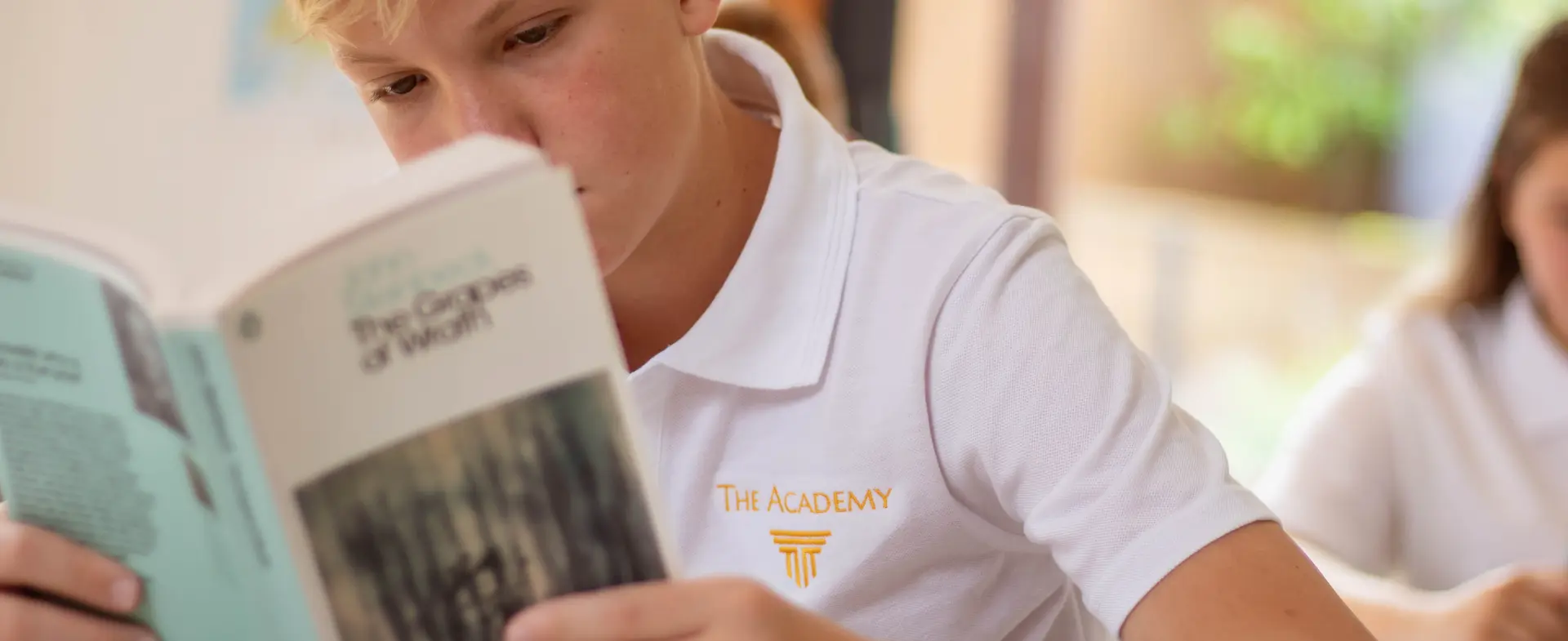English at The Academy
"A book is made from a tree. It is an assemblage of flat, flexible parts (still called "leaves") imprinted with dark pigmented squiggles. One glance at it and you hear the voice of another person, perhaps someone dead for thousands of years. Across the millennia, the author is speaking, clearly and silently, inside your head, directly to you. Writing is perhaps the greatest of human inventions, binding together people, citizens of distant epochs, who never knew one another. Books break the shackles of time- proof that humans can work magic."Carl Sagan
Reading has the highest priority at The Academy. Our students read widely and regularly at all year levels.
Reading builds empathy and helps students to strengthen and amplify their own voice, to self-advocate and to influence others using persuasive language techniques. It also builds a foundation of wide exposure and experience, giving students tools to critically analyse media and recognise bias.

"Show me a family of readers, and I will show you the people who move the world."Napoléon Bonaparte
The Academy has a strong commitment to handwriting and this is the primary tool for notetaking at the school. Our students are expected to develop their hand-written skills, and for three of our core subjects (Mathematics, English and Science), this will remain the default mode for keeping a record of learning. We know from research that both children and adults learn more and remember things more efficiently when writing by hand rather than a keyboard.
English is a subject where students take risks in expressing their thoughts and creativity. As such, the English space is treated with immense respect by all. Views and ideas are debated and critiqued openly without fear of reprisal or stigma. During perhaps the most formative years in a child's development, this space for open communication and expression and is of critical importance.
"A word after a word after a word is power."Margaret Atwood
The Academy's English programme is built around the following areas:
- Literature Exploration:
- Introduce students to classic works of literature from various genres and time periods.
- Foster a love for reading through interactive discussions and book clubs.
- Incorporate diverse voices and perspectives to promote cultural awareness.
- Engage with foundational texts, from Homeric myths and Chaucer to the masterworks of Shakespeare.
- Rhetoric, Debate, and Taking a Stand:
- Develop critical thinking skills through in-depth exploration of philosophical texts.
- The curriculum teaches the art of persuasion through Aristotle's triad (logos, ethos, pathos) and the delivery of powerful presentations on social justice and historical issues.
- Facilitate Socratic dialogues to promote collaborative, student-led discussions.
- Progress from learning the fundamentals of effective discussion to participating in formal debates, mastering the skills of proposition, opposition, and rebuttal.
- Poetry Appreciation:
- Expose students to classic and contemporary poems from various cultures.
- Analyse poetic devices, rhythm, and literary techniques.
- Encourage creative expression through student poetry writing workshops and national competitions.
- Critical Analysis of Text and Media, Including Digital Media:
- Equip students with tools for critically evaluating written and visual content.
- Explore the impact of media on language and culture.
- Teach skills to discern bias, misinformation, and propaganda in various forms of media.
- Foster digital literacy skills for responsible consumption and creation of content.
- Creative and Functional Writing:
- Cultivate students' imaginative and expressive abilities through dedicated creative writing sessions.
- Equip students with the skills to write succinct and accurate technical reports.
- Students master multiple writing styles, including ekphrastic poetry, newspaper reporting, scriptwriting, and technical analytical essays
- Writing is treated as a craft, with most units involving a cycle of drafting, peer review, and refining before final submission
- Media Studies:
- Explore the art of film and its role in storytelling.
- Explore cinematic techniques, including camera angles, editing, and sound design.
- Analyse films and television shows to understand narrative structure, character development, and symbolism.
- Independent Reading and Research:
- Cultivate a culture of independent reading, allowing students to explore personal interests.
- Guide students in conducting research projects related to literature, philosophy, or contemporary issues.
- Emphasise the importance of credible sources and proper citation.
- Presentation and Portfolios:
- Students learn to present their work through various mediums, including written reports, oral presentations, and multimedia formats.
- Develop published portfolios on the student's website to showcase students' evolving writing, analytical, and creative abilities.
"No tears in the writer, no tears in the reader. No surprise in the writer, no surprise in the reader."Robert Frost
The Middle School (Years 7 - 10) English curriculum is aligned with the Cambridge Advanced programme to ensure that our students are ready to succeed with exceptional results in this rigorous and globally recognised external assessment.
At senior levels, The Academy will offer the AS-Level English Language at Year 12 to fulfil the literacy requirements outlined in the New Zealand University Entrance Standard (UE). At Year 13, students choose to either continue to complete their full A-Level English qualification or take part in the school programme focusing on debate and advanced communication skills.
"It is not true that we have only one life to live; if we can read, we can live as many more lives and as many kinds of lives as we wish."S.I. Hayakawa
Guiding Principles for English at The Academy:
- We are readers.
- We take pride in our handwriting and written communication.
- We can critically analyse and evaluate a wide variety of text and media.
- Debate and argument are fundamental life skills to hone, with empathy as a core principle.
"Reading is to the mind what exercise is to the body."Richard Steele

